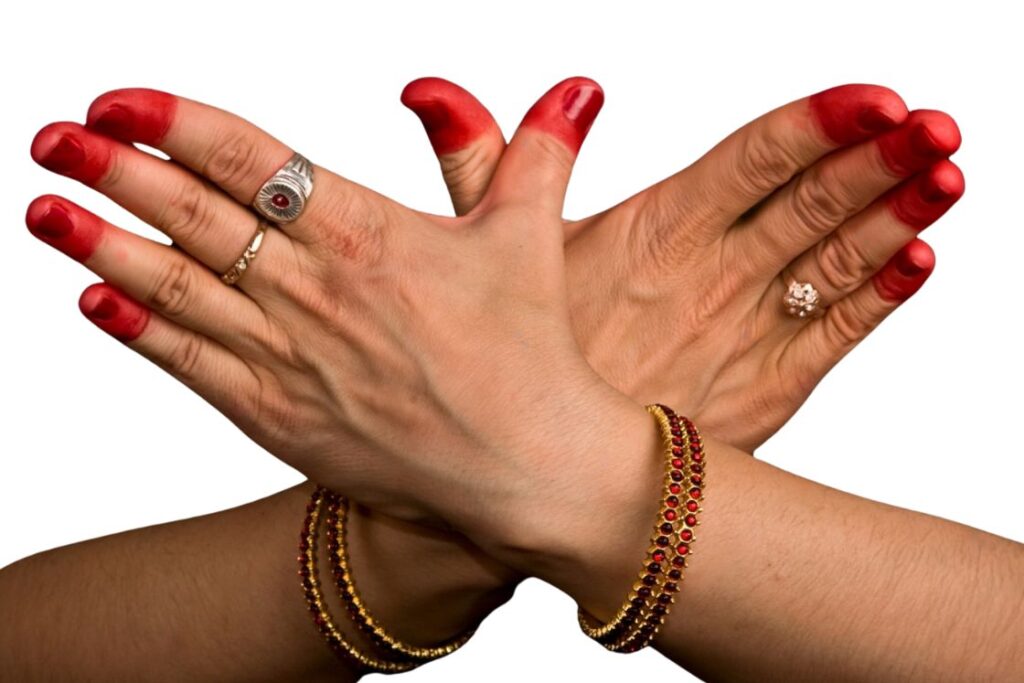Garuda Mudra (Eagle Gesture): Meaning, How to Do and Benefits
Garuda Mudra is named after the king of birds, the eagle. Known for its discipline and freedom, the eagle symbolizes these qualities, which the mudra brings to practitioners. Additionally, this mudra boosts energy and inspiration. It is specifically designed...

 Image Source: Shutterstock
Image Source: ShutterstockGaruda Mudra is named after the king of birds, the eagle. Known for its discipline and freedom, the eagle symbolizes these qualities, which the mudra brings to practitioners.
Additionally, this mudra boosts energy and inspiration. It is specifically designed to balance the air or Vata dosha in the body. A deficiency in Vata can make you feel lethargic and irritable.
To perform Garuda Mudra, interlock the thumbs with fingers extended and palms facing towards you. This hand gesture, also seen in Garudasana (eagle pose), revitalizes the body and enhances blood flow.
For more details on Garuda Mudra, including its precautions and benefits, continue reading.
Meaning
Garuda Mudra is a hand gesture where open palms and extended fingers mimic the eagle, symbolising the king of birds and wind. In Sanskrit, “Garuda” means “eagle,” and “mudra” means “gesture,” reflecting the essence of this powerful symbol.

When the thumbs are interlocked in this mudra, it signifies the merging of the thumb’s elemental energies. The thumb represents the fire element, so Garuda Mudra stimulates this fire (Agni) element in the body. This action warms and lubricates dry air, balancing the fire element and eliminating stagnant body fluids.
Garuda Mudra is often practiced alongside meditation or pranayama sessions, and is sometimes referred to as Garuda Mudra Pranayama. It is also known in English as the Eagle Pose.
Symbolic representation
In Hindu mythology, Garuda is revered as the mount of Lord Vishnu, the God of Preservation. This powerful bird is known as the king of birds and the wind.
The Garuda Mudra is named after Garuda to embody the fierce, disciplined, and committed nature associated with this mythical bird. Garuda’s vast wings, which it uses to soar across the endless sky, symbolize freedom. Similarly, the hand gesture in Garuda Mudra imitates the eagle’s expansive wings, representing a sense of inner freedom and strength.
Connection with chakras
Garuda Mudra is particularly beneficial for balancing and energising specific chakras, especially the Vishuddha (throat) chakra. Here’s how it impacts the chakras:
Vishuddha (Throat) Chakra: Practicing Garuda Mudra helps activate and cleanse the Vishuddha chakra, which is associated with communication and expression. This mudra, combined with pranayama, supports detoxification and purification, enhancing the overall function of the throat chakra. Muladhara (Root) Chakra: The grounding and stabilising qualities of Garuda Mudra can indirectly support the Muladhara chakra, promoting a sense of stability and security.By integrating Garuda Mudra into your practice, you can harmonise these energy centres, fostering a deeper connection with your inner self and enhancing overall well-being.
How to do Garuda Mudra(steps)
 Image Source: shutterstockSit in a comfortable posture like Padmasana or Vajrasana.
Place your hands with palms facing upwards on your thighs or knees.
Close your eyes and take some deep breaths.
Overlap the right wrist over the left, extending the fingers of both hands.
Interlock both thumbs by hooking the right thumb on the knuckle of the left.
Place your hands with interlocked thumbs at the lower abdomen with palms facing you and stay there for 10 breaths.
Move your hands closer to the navel and take 10 deep breaths.
Place your hands at the pit of the stomach and take 10 deep breaths.
Enhance the practice by chanting “OM” to focus the mind.
Image Source: shutterstockSit in a comfortable posture like Padmasana or Vajrasana.
Place your hands with palms facing upwards on your thighs or knees.
Close your eyes and take some deep breaths.
Overlap the right wrist over the left, extending the fingers of both hands.
Interlock both thumbs by hooking the right thumb on the knuckle of the left.
Place your hands with interlocked thumbs at the lower abdomen with palms facing you and stay there for 10 breaths.
Move your hands closer to the navel and take 10 deep breaths.
Place your hands at the pit of the stomach and take 10 deep breaths.
Enhance the practice by chanting “OM” to focus the mind.
Note: You can also practice Garuda Mudra while standing in Tadasana or sitting in a chair.
Time & Duration
Best Time: Practicing Garuda Mudra in the morning is ideal, but it can be performed any time you can sit for mindful breathing or chant. Duration: Aim for 5 minutes per session, three times a day, or hold for 15 minutes in one stretch. Practice Frequency: Consistency is key; practice regularly for best results.Precautions
Avoid if you have shoulder or wrist issues; stop if you feel pain. If you have high blood pressure, practice carefully. Proceed carefully if you are hyperactive. Stop if you experience pain or discomfort. Avoid over-practicing; adhere to recommended duration.Side effects
Garuda Mudra generally has no significant side effects. However, it is important to practice it without causing discomfort or applying excessive pressure.
Garuda Mudra Benefits
Garuda Mudra is a powerful hand gesture that alleviates muscle spasms, menstrual cramps, and digestive issues by balancing Vata dosha. It enhances digestion, reduces fatigue, and calms the mind. This mudra also supports respiratory health, improves blood circulation, strengthens immunity, and aids in detoxification.
Boosts Activity: By practicing Garuda Mudra, the body’s energy levels increase, reducing feelings of lethargy. The mudra stimulates energy flow, making you feel more active and less tired. Improves Blood Circulation: Garuda Mudra enhances blood flow throughout the body. This improved circulation helps to address circulation issues and ensures that the body’s tissues receive adequate oxygen and nutrients. Balances Vata Dosha: The mudra specifically targets the air element, or Vata dosha, which can become imbalanced, leading to dryness and restlessness. Garuda Mudra helps restore balance by regulating this dosha, reducing symptoms like irritability and dryness. Eases Menstrual Pain: The practice of Garuda Mudra can help alleviate menstrual cramps by increasing circulation and stimulating energy flow. This can reduce discomfort and provide relief during menstruation. Supports Respiratory Health: By improving overall energy flow and stimulating the fire element, Garuda Mudra helps in relieving respiratory difficulties. It can assist in clearing the airways and improving breathing. Stabilises Mood: Regular practice of Garuda Mudra can help stabilize mood fluctuations and reduce stress. The mudra’s calming effects on the mind can lead to a more balanced emotional state and reduced anxiety. Balances Body Energy: The mudra harmonises energy across both sides of the body, ensuring an even distribution of energy. This balance contributes to overall well-being and prevents energy blockages. Promotes Discipline: Practicing Garuda Mudra can foster a sense of discipline and fearlessness. It encourages focus and commitment, helping you approach challenges with a more disciplined mindset. Supports Detoxification: Advanced practitioners use Garuda Mudra to detoxify physical and mental toxins, especially when combined with pranayama. It supports the throat (Vishuddha) chakra, aiding in purification and detoxification, and is known as Garuda Mudra Chakra.Conclusion
Garuda Mudra has many benefits for both the body and mind. It boosts energy, helps balance the Vata dosha, and improves blood flow, which can reduce tiredness, support breathing, and ease menstrual cramps. It also helps stabilize mood, increase energy, and build discipline. When done with breathing exercises, Garuda Mudra helps clean the body and supports the throat chakra. This makes it a great practice to add to your routine for feeling healthier and clearer.

 Troov
Troov 
































.jpg&h=630&w=1200&q=100&v=f776164e2b&c=1)